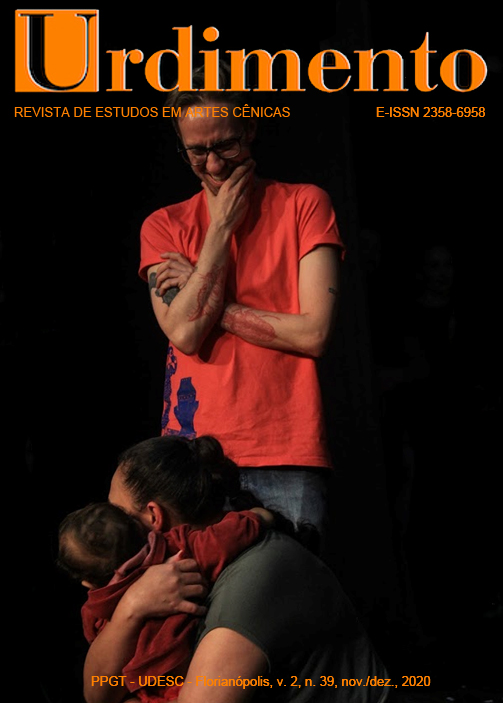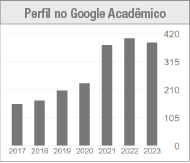Recuerdos al sol: en busca de una dramaturgia de escucha con mujeres em privación de libertad
DOI:
https://doi.org/10.5965/14145731033920200114Palabras clave:
Pedagogía Teatral, Prisión Femenina, Dramaturgia de escucha, Recuerdos al solResumen
Este artículo analiza un proceso artístico-pedagógico con mujeres em prisión, que tuvo lugar em 2019, en el Penal de Mujeres de Florianópolis, em Santa Catarina. Al comprender que una de las estrategias de la prisión es la invisibilidad de las personas sometidas a ella, ya que sus historias son construidas por otros e incluso a partir de estigmas, intentamos ir en contra de estos procesos. Así, las propuestas del taller se centraron em el desarrollo de prácticas que exigían una reapropiación y re significación de las historias de vida, a partir del terreno del teatro. A partir de escuchar los materiales generados y el proceso em sí, buscamos construir una escritura que no omitiera las voces de las mujeres que hicieron el taller, pero que estuvieran enfocadas.
Descargas
Citas
DAVIS, Angela. Estarão as prisões obsoletas?. Tradução: Marina Vargas. Rio de Janeiro: Difel, 2018.
CONCILIO, Vicente. Teatro e prisão: dilemas da liberdade artística. São Paulo, Hucitec, 2008.
CONCILIO, Vicente. Criar atrás das grades, libertar-se das paredes: desafios da cena construída no Presídio Feminino de Florianópolis. Caixa de Ponto, Florianópolis, n.11, p.20, 2020. Disponível em: < https://7def63e5-712c-41aa-b56cd66c7d4ff3e2.filesusr.com/ugd/23361d_8a8c4691e74d4976919eaae980363ed5.pdf >Acesso em: 10 out. 2020.
CONCILIO, Vicente; VETORI, Caroline. Relato solto de uma oficina atrás das grades: um processo de escrita teatral dentro do Presídio Feminino de Florianópolis. Iaçá Artes da Cena, Amapá, v.2, n.2, p.120-132, 2019. Disponível em: <https://periodicos.unifap.br/index.php/iaca/article/view/5088> Acesso em: 10 out. 2020.
EVARISTO, Conceição. Literatura negra: uma poética de nossa afro-brasilidade. SCRIPTA, Belo Horizonte, v. 13, n. 25, p. 17-31, 2º sem. 2009.
FLAUZINA, Ana Luiza Pinheiro. Corpo negro caído no chão: o sistema penal e o projeto genocida do Estado brasileiro. Dissertação (Mestrado em Direito) – Faculdade de Direito, Universidade de Brasília. Brasília. p. 145. 2006 Disponível em: <http://repositorio.unb.br/handle/10482/5117>. Acesso em: 12 dout. 2020.
FOUCAULT, Michel. Vigiar e punir: nascimento da prisão. Tradução: Raquel Ramalhete. Rio de Janeiro: Vozes, 2008.
GAGNEBIN, Jeanne Marie. Lembrar, escrever, esquecer. São Paulo: Editora 34, 2006.
GOFFMAN, Erving. Estigma: notas sobre a manipulação da identidade deteriorada. Tradução: Márcia Bandeira de Mello Leite Nunes. Rio de Janeiro: LTC, 1975.
GOFFMAN, Erving. Manicômios, prisões e conventos. Tradução: Dante Moreira Leite. São Paulo: Perspectiva, 2001.
HOLLOWAY, John. Fissurar o capitalismo. Tradução: Daniel Cunha. São Paulo: Publisher, 2013.
KILOMBA, Grada. Memórias da plantação: episódios de racismo cotidiano. Tradução: Jess Oliveira. Rio de Janeiro: Cobogó. 2019.
LEONARDELLI, Patricia. A memória como recriação do vivido: um estudo da história do conceito de memória aplicado às artes performativas na perspectiva do depoimento pessoal. Tese (Doutorado em Artes Cênicas) – Escola de Comunicações e Artes, Universidade de São Paulo. São Paulo. p. 236. 2008.
POMPEO, Marcia. Pistas para pesquisa de uma comunidade como base para um trabalho teatral. Anais ABRACE, v. 12, n. 1, 2011.
PORTELLI, Alessandro. História oral como arte da escuta. Tradução: Ricardo Santhiago. São Paulo: Letra e Voz, 2016.
RIBEIRO, Djamila. O que é lugar de fala?. Belo Horizonte: Letramento. 2017.
ROSA, Marinês. A escrita de si entre mulheres encarceradas: a experiência metodológica com recurso da literatura marginal. Disponível em: < http://www.sbs2019.sbsociologia.com.br/arquivo/downloadpublic?q=YToyOntzOjY6InBhcmFtcyI7czozNToiYToxOntzOjEwOiJJRF9BUlFVSVZPIjtzOjQ6IjEwMDgiO30iO3M6MToiaCI7czozMjoiZWY0MTY1MjJkOTU0MjcxMTRmYzI1NDU3OWVjNWQzYWMiO30%3D > Acesso em: 10 jan. 2020.
SPIVAK, Gayatri Chakravorty. Pode o subalterno falar?. Tradução: Sandra Regina Goulart Almeida, Marcos Pereira Feitosa, André Pereira Feitosa. Belo Horizonte: UFMG, 2010.
Descargas
Publicado
Cómo citar
Número
Sección
Licencia
Derechos de autor 2020 Urdimento - Revista de Estudios en Artes Escènicas

Esta obra está bajo una licencia internacional Creative Commons Atribución 4.0.
Declaración de Derecho de lo Auctor
Los artículos publicados por la revista son de uso gratuito. Los derechos de autor son todos cedidos a la revista. Los artículos cuyos autores son identificados representan la expresión del punto de vista de sus autores y no la posición oficial de la revista Urdimento. El autor o los autores se comprometen a que publiquen material referente al artículo publicado en la Revista Urdimento mencionar dicha publicación de la siguiente forma:
"Este artículo fue publicado originalmente por la revista Urdimento en su volumen (poner el volumen), número (poner el número) en el año de (poner el año) y puede ser accedido en: http://www.revistas.udesc.br/index.php/urdimento
Este periódico utiliza una Licencia de Atribución Creative Commons - CC - BY 4.0.



